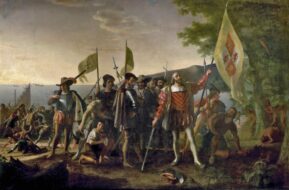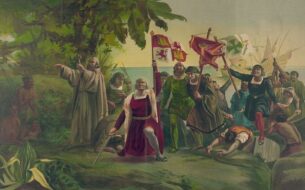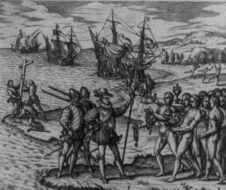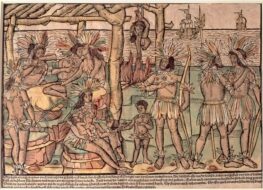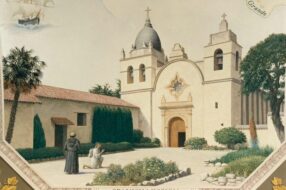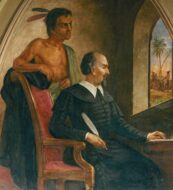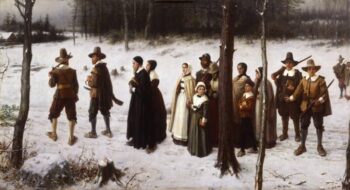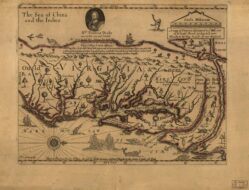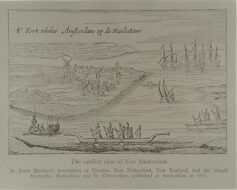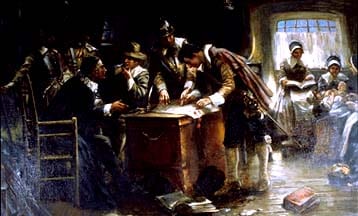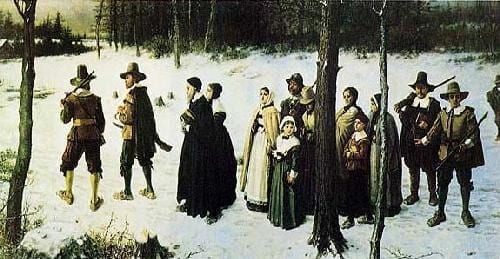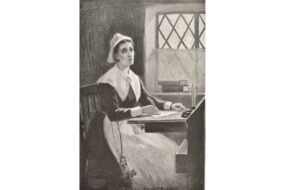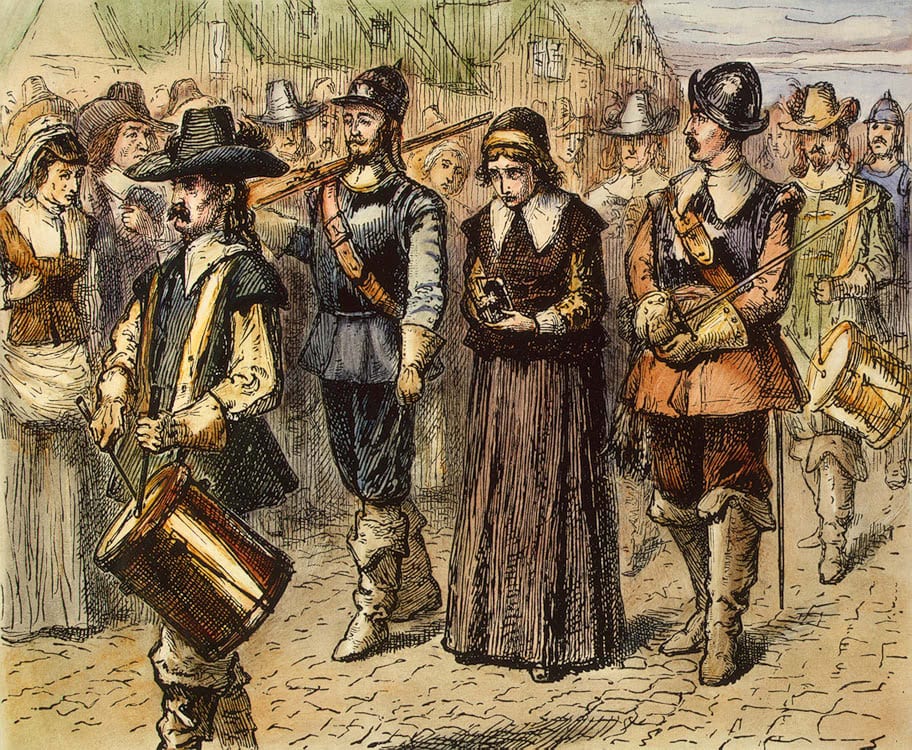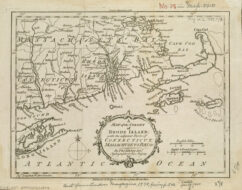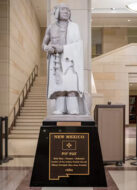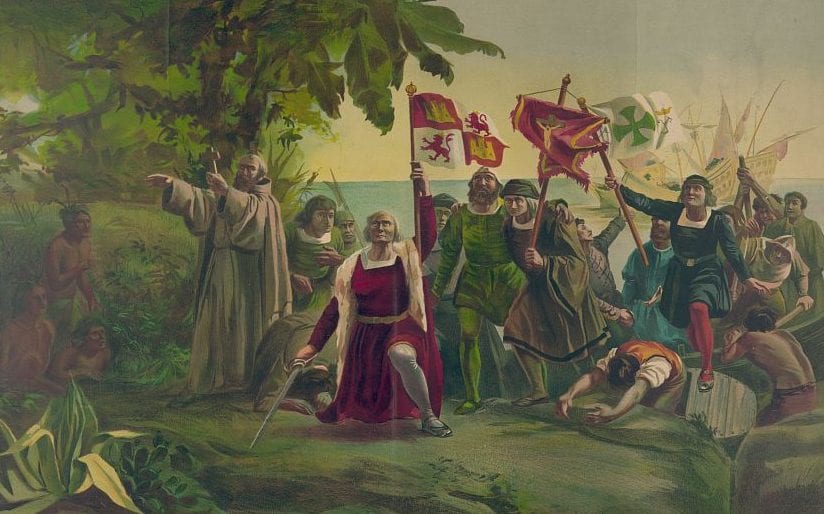
No study questions
No related resources
Introduction
How to treat the indigenous people became an issue as soon as the Spanish arrived in the Western Hemisphere. In this letter written soon after his first voyage, Christopher Columbus explained how he dealt with the natives and revealed his and Spain’s religious motive for exploring what he conceived to be, in explicitly religious terms (see Christopher Columbus to Doña Juana de Torres, 1500) a New World. In addition to the converts to Catholicism that Columbus mentions, the Spanish sought gold. What means were allowable in pursuit of these ends? By what authority did the Spanish make claims on the native people and their land? The Requerimiento provided the official answer to these questions.
Whatever Spanish justifications, the Spanish conquistadores or conquerors proved brutal and rapacious as the conquest continued. The authorities in Madrid did not approve. For example, laws regulating conduct in the conquest were promulgated in 1513 and 1542 (the latter partially repealed in 1545 because of opposition). They relieved Christopher Columbus of command over land he had discovered in part because of his brutality toward both Spanish settlers and the indigenous people. Columbus complained of the injustice of his removal (see Christopher Columbus to Doña Juana de Torres, 1500), by emphasizing that the New World was not like Spain but was an uncivilized lawless territory. Francisco de Vitoria, on the contrary, (see De Indis) sought to mitigate the harshness of the conquest by arguing that law – civil, natural and divine – should prevail everywhere. He argued for limits on what could legitimately be done to the indigenous people. In doing so, he helped develop just war theory. Despite de Vitoria’s arguments, distance from Madrid, limited means of communication, and the need for colonial wealth reduced the ability and willingness of Spain’s monarchs to control what was done in their name thousands of miles away from their palaces. Bartolomé de las Casas (A Short Description of the Destruction of the Indies, 1542) describes the consequences of the Spanish conquest.
Source: Writings of Christopher Columbus: Descriptive of the Discovery and Occupation of the New World, Paul Leicester Ford, ed. (New York: C. L. Webster, 1892), 33-51.
A Letter addressed to the noble Lord Raphael Sanchez, Treasurer to their most invincible Majesties, Ferdinand and Isabella, King and Queen of Spain, by Christopher Columbus
. . . In that island also which I have before said we name Española, there are mountains of very great size and beauty, vast plains, groves, and very fruitful fields, admirably adapted for tillage, pasture, and habitation. The convenience and excellence of the harbors in this island, and the abundance of the rivers, so indispensable to the health of man, surpass anything that would be believed by one who had not seen it. The trees, herbage, and fruits of Española are very different from those of Juana, and moreover it abounds in various kinds of spices, gold, and other metals. The inhabitants of both sexes in this island, and in all the others which I have seen, or of which I have received information, go always naked as they were born, with the exception of some of the women, who use the covering of a leaf, or small bough, or an apron of cotton which they prepare for that purpose. None of them, as I have already said, are possessed of any iron, neither have they weapons, being unacquainted with, and indeed incompetent to use them, not from any deformity of body (for they are well-formed), but because they are timid and full of fear. They carry however in lieu of arms, canes dried in the sun, on the ends of which they fix heads of dried wood sharpened to a point, and even these they dare not use habitually; for it has often occurred when I have sent two or three of my men to any of the villages to speak with the natives, that they have come out in a disorderly troop, and have fled in such haste at the approach of our men, that the fathers forsook their children and the children their fathers. This timidity did not arise from any loss or injury that they had received from us; for, on the contrary, I gave to all I approached whatever articles I had about me, such as cloth and many other things, taking nothing of theirs in return: but they are naturally timid and fearful. As soon however as they see that they are safe, and have laid aside all fear, they are very simple and honest, and exceedingly liberal with all they have; none of them refusing anything he may possess when he is asked for it, but on the contrary inviting us to ask them. They exhibit great love towards all others in preference to themselves: they also give objects of great value for trifles, and content themselves with very little or nothing in return. I however forbad that these trifles and articles of no value (such as pieces of dishes, plates, and glass, keys, and leather straps) should be given to them, although if they could obtain them, they imagined themselves to be possessed of the most beautiful trinkets in the world. It even happened that a sailor received for a leather strap as much gold as was worth three golden nobles, and for things of more trifling value offered by our men, especially newly coined blancas, or any gold coins, the Indians would give whatever the seller required; as, for instance, an ounce and a half or two ounces of gold, or thirty or forty pounds of cotton, with which commodity they were already acquainted. Thus they bartered, like idiots, cotton and gold for fragments of bows, glasses, bottles, and jars; which I forbad as being unjust, and myself gave them many beautiful and acceptable articles which I had brought with me, taking nothing from them in return; I did this in order that I might the more easily conciliate them, that they might be led to become Christians, and be inclined to entertain a regard for the King and Queen, our Princes and all Spaniards, and that I might induce them to take an interest in seeking out, and collecting, and delivering to us such things as they possessed in abundance, but which we greatly needed. They practice no kind of idolatry, but have a firm belief that all strength and power, and indeed all good things, are in heaven, and that I had descended form thence with these ships and sailors, and under this impression was I received after they had thrown aside their fears. Nor are they slow or stupid, but of very clear understanding; and those men who have crossed to the neighboring islands give an admirable description of everything they observed; but they never saw any people clothed, nor any ships like ours. On my arrival at that sea, I had taken some Indians by force from the first island that I came to, in order that they might learn our language, and communicate to us what they knew respecting the country; which plan succeeded excellently, and was a great advantage to us, for in a short time, either by gestures and signs, or by words, we were enabled to understand each other. These men are still traveling with me, and although they have been with us now a long time, they continue to entertain the idea that I have descended from heaven; and on our arrival at any new place they published this, crying out immediately with a loud voice to the other Indians, “Come, come and look upon beings of a celestial race”: upon which both women and men, children and adults, young men and old, when they got rid of the fear they at first entertained, would come out in throngs, crowding the roads to see us, some bringing food, others drink, with astonishing affection and kindness. . . . In all these islands there is no difference of physiognomy, of manners, or of language, but they all clearly understand each other, a circumstance very propitious for the realization of what I conceive to be the principal wish of our most serene King, namely, the conversion of these people to the holy faith of Christ, to which indeed, as far as I can judge, they are very favorable and well-disposed.

Conversation-based seminars for collegial PD, one-day and multi-day seminars, graduate credit seminars (MA degree), online and in-person.
